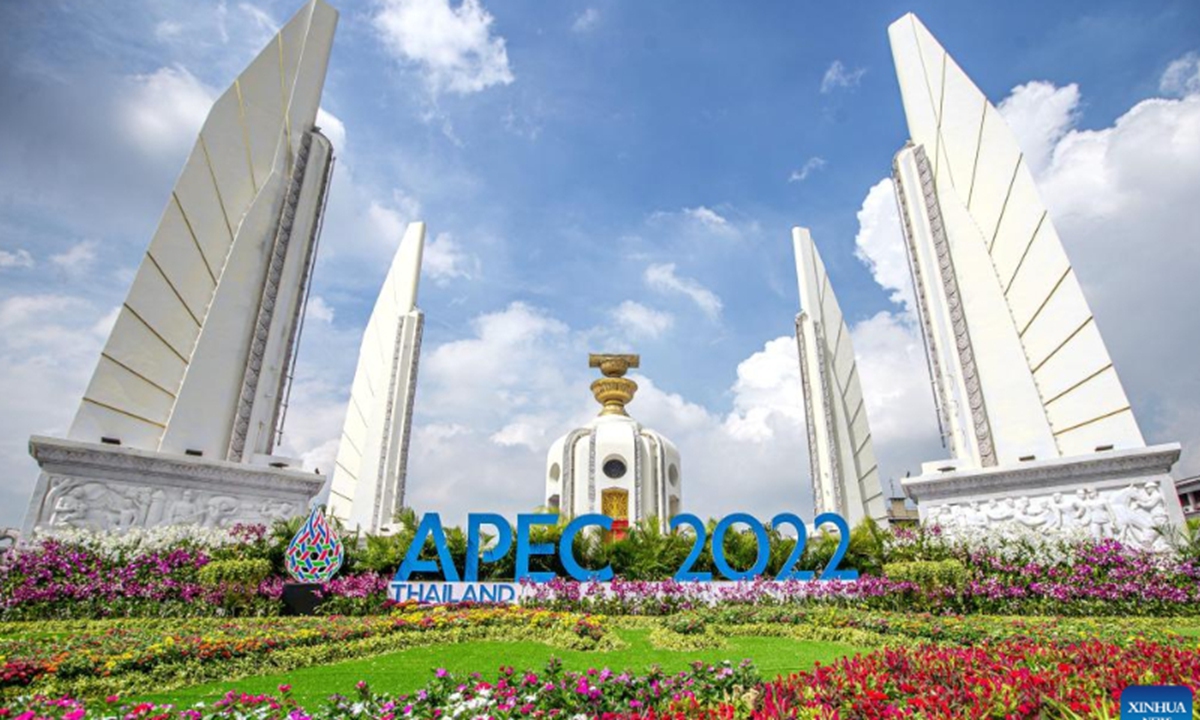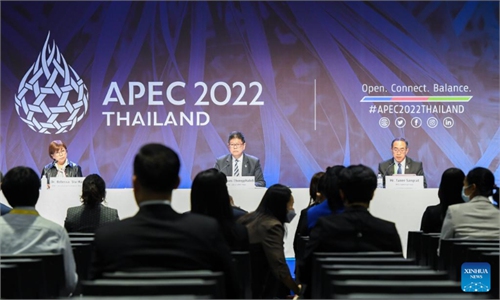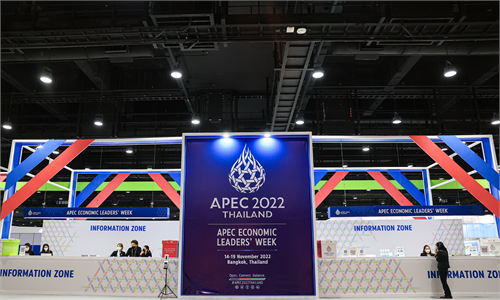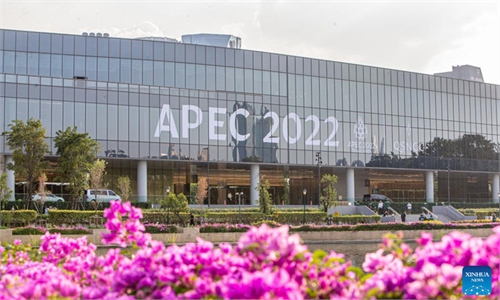
A logo of APEC 2022 is pictured on a street in Bangkok, Thailand, November 16, 2022. Photo: Xinhua
The 29th Asia-Pacific Economic Cooperation (APEC) Economic Leaders' Meeting will be held in Bangkok, Thailand, on Friday and Saturday. The importance of the meeting cannot be overstated at a time when the global economy and regional cooperation in the Asia-Pacific are facing serious challenges. The absence of US President Joe Biden from the APEC meeting is not a sign that the US, the region's strongest economy, values regional cooperation. At the same time, some analysts point out that the US strategic focus on the Asia-Pacific region is to overshadow or trump China's influence in the region.A Thursday US media report said that Biden's absence was regrettable, but it doesn't mean that the US is ceding economic influence in the Asia-Pacific region. Indeed, US Vice President Kamala Harris is expected to cast the US as the Indo-Pacific's "better partner" for economic stability during the upcoming APEC meeting, according to media reports.
If anything, the voices emphasizing the importance the US has attached to economic partners in the region cannot obscure the fact that the US cannot come up with a vision that can deliver real benefits to the Asia-Pacific region.
Everyone knows what geopolitical goals the US is going after in the Asia-Pacific region, but people are at a loss as to what more tangible benefits the US can bring to the region. Now one of the main reasons why US media outlets are concerned that China may gain the upper hand in the Asia-Pacific region is that the US' influence in the region is weakening or diluting. If the US strategy is aimed at containing China, it won't bring real benefits to regional countries, and neither can it win real support from regional countries. The Asia-Pacific strategy pursued by the US is to serve its own geopolitical purposes, and this is what most countries are worried about and opposed to.
For instance, during the APEC meeting, Harris is expected to touch on the Indo-Pacific Economic Framework (IPEF) that the Biden administration launched earlier this year. While Washington once boasted that the IPEF would establish "an affirmative economic agenda" in the region, it is no secret that economic cooperation is just a guise to cover up Washington's real purpose of creating a small circle of supply chains and industrial chains in the Asia-Pacific region that is "decoupled" from China, which obviously harms the interests of regional countries.
By comparison, China has been persistent in promoting the win-win cooperation with regional economies. The comprehensive trial operation of the Jakarta-Bandung High-Speed Railway (HSR) in Indonesia achieved successful results. As the first high-speed rail line in Southeast Asia, the project is indicative of not only China's strength in infrastructure development, but also its readiness to share its development dividends with other countries in need.
In addition to the billions of dollars of BRI projects to build high-speed rail, bridges, dams, and highways in Southeast Asia, the Regional Comprehensive Economic Partnership (RCEP) that is aimed at cutting tariffs and non-tariff barriers to promote regional economic integration also came into effect earlier this year.
With so many tangible progress and achievements, economic and trade cooperation between China and other Asia-Pacific economies won't be affected by the external forces.
It is also important to note that it is meaningless for some Western media outlets to repeatedly play up the US participation and attention to regional economic cooperation. No matter what strategy the US proposes to contain China in the region, as long as the US cannot come up with a truly win-win and cooperative plan, or is unwilling to invest in regional cooperation, the expectation of Asia-Pacific economies will be waning gradually.
Most Asia-Pacific economies still hold fresh memories of the TPP, the regional free trade pact the US withdrew because of its reluctance to grant wider market access. After failing to provide the region a bigger market, the US has ratcheted up pressure on regional countries to take sides between China and the US, but this will only increase the disappointment and antipathy of regional economies toward the US.
Indeed, what the US pressure has made it clear is that cooperation, not confrontation, is the only way to achieve development and prosperity for Asia-Pacific economies.



